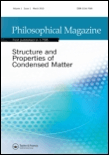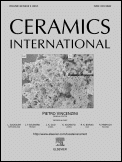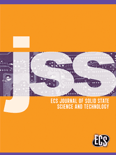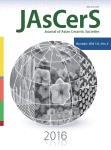
Journal of Advanced Dielectrics
metrics 2024
Bridging Theory and Application in Material Science
Introduction
The Journal of Advanced Dielectrics, published by World Scientific Publishing Co Pte Ltd, is a pivotal open-access platform since 2014 dedicated to advancing research in the fields of dielectrics, ceramics, and composites. Based in Singapore, this journal aims to bridge the gap between theoretical developments and practical applications in Electrical and Electronic Engineering, Condensed Matter Physics, and Electronic, Optical, and Magnetic Materials. With an impressive classification in the 2023 Quartile Rankings indicating its significance within its categories, and notable Scopus Rankings that highlight its impact and relevance, this journal serves as a vital resource for scholars and professionals committed to cutting-edge research and innovation. As it continues to flourish through the converging years from 2015 to 2024, the Journal of Advanced Dielectrics stands as an essential conduit for the dissemination of knowledge in advanced material sciences, making it an indispensable asset for today's research community.
Metrics 2024
 0.37
0.37 2.10
2.10 2.20
2.20 26
26Metrics History
Rank 2024
Scopus
IF (Web Of Science)
JCI (Web Of Science)
Quartile History
Similar Journals

PHYSICS OF THE SOLID STATE
Unveiling the Secrets of Electronic, Optical, and Magnetic MaterialsPhysics of the Solid State is a distinguished journal published by Pleiades Publishing Inc., focusing on the rapid advancements and fundamental research in the realms of condensed matter physics, electronic, optical, and magnetic materials. With an ISSN of 1063-7834 and an E-ISSN of 1090-6460, this journal serves as a crucial platform for disseminating high-quality research findings, insights, and reviews essential for both academic and industrial professionals in the field. As of 2023, its Scopus ranking places it in the 26th percentile for both Condensed Matter Physics and Electronic, Optical and Magnetic Materials, reflecting its evolving influence and contribution to the scientific community. Although currently classified in the Q4 quartile, the journal aims to foster interdisciplinary dialogue, improve research visibility, and enhance its impact on contemporary scientific challenges through rigorous peer-reviewed articles and focused special issues. Despite its traditional model of access, it continues to play a pivotal role in engaging researchers and fostering innovation in solid-state physics.

Materials Letters-X
Fostering Innovation in Condensed Matter PhysicsMaterials Letters-X, published by ELSEVIER, is an esteemed open-access journal dedicated to the rapid communication of research in the fields of Condensed Matter Physics, Materials Science, Mechanical Engineering, and Mechanics of Materials. Launched in 2019, this journal has quickly established itself within the academic community, achieving Q3 quartile rankings in several categories according to the 2023 metrics. The journal's impactful contributions are reflected in its Scopus rankings, notably within Mechanical Engineering (Rank #308) and Mechanics of Materials (Rank #199). The open-access model promotes widespread dissemination and accessibility, ensuring that cutting-edge advancements in material science are readily available to researchers, professionals, and students worldwide. As it continues to grow, Materials Letters-X aims to inspire innovation and collaboration across disciplines, making it a pivotal resource for those engaged in material research and applications.

PHILOSOPHICAL MAGAZINE
Unlocking Insights in Condensed Matter ResearchPHILOSOPHICAL MAGAZINE, published by Taylor & Francis Ltd, is a distinguished journal that focuses on the field of Condensed Matter Physics. With an ISSN of 1478-6435 and an E-ISSN of 1478-6443, this journal serves as a vital platform for researchers and professionals seeking to disseminate and access cutting-edge research and developments in the field. Currently ranked in the Q3 category within its discipline according to the 2023 quartiles, and positioned at the 45th percentile in Scopus rankings, PHILOSOPHICAL MAGAZINE is recognized for its significant contributions to theoretical and experimental physics. The journal embraces open access options, enhancing its reach and accessibility to a global audience. With coverage spanning from 2003 through 2024, it remains a cornerstone for scholars and students who aim to deepen their understanding of the complexities within condensed matter systems. For anyone engaged in the physical sciences, PHILOSOPHICAL MAGAZINE offers invaluable insights and fosters an environment of rigorous academic inquiry.

SEMICONDUCTORS
Shaping the landscape of advanced material science.SEMICONDUCTORS, published by PLEIADES PUBLISHING INC, is a prominent journal that provides a platform for researchers and professionals in the fields of Atomic and Molecular Physics, Condensed Matter Physics, and Electronic, Optical and Magnetic Materials. With an ISSN of 1063-7826 and an E-ISSN of 1090-6479, the journal has been diligently disseminating knowledge since its inception in 1996 and continues to pave the way for innovative research until 2024. Although currently unclassified in the Open Access model, its influence is underscored by its rankings in Scopus, where it ranks in the 21st-22nd percentile across critical scientific categories. SEMICONDUCTORS serves as an essential resource for cutting-edge research, fostering a greater understanding of semiconductor materials and their applications, thereby assisting the scientific community in pushing the boundaries of technology and innovation.

Ceramics International
Connecting researchers to the latest in ceramic technologies.Ceramics International is a premier journal published by ELSEVIER SCI LTD, focusing on advancing the field of materials science with a specific emphasis on ceramics and composites. With an impressive impact factor and a top-tier standing in several critical categories, including Q1 rankings in Ceramics and Composites, Electronic, Optical and Magnetic Materials, and Materials Chemistry, this journal serves as a crucial resource for researchers and professionals alike. Established in 1981, it has consistently showcased cutting-edge research in various domains, including surfaces, coatings, and process chemistry technologies, making it invaluable for those advancing theoretical and practical knowledge in these areas. While access is through subscription, the journal’s rich content, profound insights, and rigorous peer-review process ensure high-quality articles that contribute meaningfully to the scientific community. By fostering innovation and collaboration through rigorous research, Ceramics International stands out as an authoritative source for those dedicated to the evolution of materials science.

ECS Journal of Solid State Science and Technology
Exploring Innovations in Electronic, Optical, and Magnetic MaterialsECS Journal of Solid State Science and Technology, published by the Electrochemical Society, is a prominent journal dedicated to the advancement of research in the field of electronic, optical, and magnetic materials. With an ISSN of 2162-8769 and an E-ISSN of 2162-8777, this journal has established a significant presence since its inception in 2012, spanning critical developments in solid-state science that are essential for innovative technologies. Operating within the United States and recognized for its global outreach, it holds a respectable Q3 category ranking in the materials science category as of 2023, reflecting its commitment to high-quality research and its role in bridging theoretical and applied aspects of materials science. Researchers, professionals, and students alike will find vital information and cutting-edge studies that further the understanding and applications of solid-state technologies. The journal is accessible to an extensive audience, making it an invaluable resource for those engaged in the ever-evolving landscape of materials science.

JOURNAL OF THE CERAMIC SOCIETY OF JAPAN
Advancing ceramic innovation through interdisciplinary research.Journal of the Ceramic Society of Japan is a prominent peer-reviewed journal dedicated to advancing the field of ceramics and composites. Published by Ceramic Society Japan - Nippon Seramikksu Kyokai, this journal serves as a critical platform for innovative research and development within the realms of materials science and condensed matter physics. Established in 1988, it converges a rich history of contributions and anticipates further advancements through 2024. With an emphasis on interdisciplinary research, the journal ranks in the third quartile in multiple categories, including Ceramics and Composites and Materials Chemistry, promising valuable insights for academics and industry professionals alike. Despite its robust academic standing, the journal currently operates without open access, reflecting the challenges of disseminating specialized research in today's competitive landscape. Whether you are a seasoned researcher or an aspiring student, Journal of the Ceramic Society of Japan offers essential resources that can enhance your understanding and foster innovation in ceramic materials.

Journal of Asian Ceramic Societies
Unlocking the potential of ceramic science.The Journal of Asian Ceramic Societies, published by Taylor & Francis Ltd, is a peer-reviewed open-access journal that has been at the forefront of ceramic research since its inception in 2013. With an ISSN of 2187-0764, this esteemed journal is dedicated to advancing the scientific understanding of ceramics and composites, bolstered by an impressive ranking of Q2 in the field of Materials Science. Covering a wide range of topics pertinent to ceramics, the journal aims to foster collaboration among researchers, professionals, and students across Asia and beyond. Its commitment to accessibility allows a global audience to engage with cutting-edge research, reflected in its Scopus ranking of #45 out of 127 in the Materials Science category. With a publication timeline extending to 2024, the Journal of Asian Ceramic Societies is an indispensable resource for anyone looking to stay informed on the latest developments and innovations in ceramic technology.

Applied Science and Convergence Technology
Pioneering Research for a Convergent FutureApplied Science and Convergence Technology (ISSN: 2288-6559) is a premier academic journal published by the Korean Vacuum Society, dedicated to advancing knowledge in the intersecting fields of condensed matter physics, electrical and electronic engineering, materials science, and theoretical chemistry. Based in South Korea, this journal serves as an essential platform for researchers, professionals, and students seeking to explore innovative applications and methodologies that drive convergence in science and technology. With a convergence period spanning from 2019 to 2024, the journal aims to publish high-quality original research and review articles that foster collaboration and knowledge sharing across disciplines. Its current quartiles position in top categories, alongside a respectable rank in Scopus, highlights its significance within the scientific community, although it is presently classified within lower tiers. The journal's commitment to open access ensures that vital research findings are accessible to a global audience, facilitating advancements in science and technology. As a notable outlet in its field, Applied Science and Convergence Technology continues to attract contributions that not only challenge current paradigms but also pave the way for future innovations.

JOURNAL OF MATERIALS SCIENCE-MATERIALS IN ELECTRONICS
Advancing the Frontiers of Materials in ElectronicsJOURNAL OF MATERIALS SCIENCE-MATERIALS IN ELECTRONICS, published by Springer, is a distinguished international journal that serves as a vital platform for the dissemination of cutting-edge research in the field of materials science, with a keen focus on electronics. Since its inception in 1990, this journal has consistently contributed to the advancement of knowledge across a range of interdisciplinary categories, including Atomic and Molecular Physics, Optical and Magnetic Materials, and Biomedical Engineering, achieving notable quartile positions in various 2023 Scopus rankings. With an impact factor that signifies its scholarly influence, this journal provides a rigorous peer-reviewed environment for researchers and practitioners to share innovative ideas, experimental findings, and theoretical developments. Although it does not currently offer open access options, the depth and breadth of topics covered—including condensed matter physics and bioengineering—make it an essential resource for those at the forefront of materials research. With a commitment to bridging the gap between theory and practical application, the JOURNAL OF MATERIALS SCIENCE-MATERIALS IN ELECTRONICS continues to pave the way for future explorations in the ever-evolving landscape of materials science.